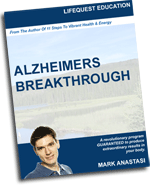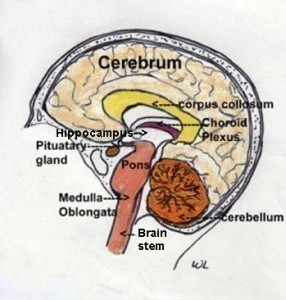Alzheimer’s Disease
Alzheimer’s Disease is a disease that affects the brain. It is a degenerative, incurable terminal disease. It is mostly defined or referred to as a progressive and fatal brain disease. Alzheimer’s Disease is a common form for dementia that affects memory and eventually leads to disturbances with regard to using language, reasoning, planning and perception.
Symptoms of Alzheimer’s Disease
The following include some of the possible symptoms of Alzheimer’s Disease.
- In the initial stages, the patient might suffer from frequent loss of memory even recently occurred events. This is often dismissed as signs of ageing. Family and friends realize only in retrospect that the loss of memory marked the early stages of Alzheimer’s.
- Patients may also display signs of apathy and lack of ability to focus or concentrate. They may suffer from mood swings and may seem irritable and quarrelsome.
- As the disease progresses, they may be unable to do simple everyday tasks and may display an inability to recall date, time, place and so on. They may also begin to loss control over language.
- Apart from a sense of disorientation of time and place, they will indicate a poor sense of judgment. Loss of initiative, frequently misplacing things, problems with abstract thinking and changes in personality are some of the other symptoms related with Alzheimer’s Disease.
Stages of Alzheimer’s Disease
Alzheimer’s Disease progressively deteriorates in four stages. The first stage is referred to as the pre-dementia stage. Cognitive and functional impairments begin to manifest themselves in the form of memory loss and a sense of apathy in the patients. Early stages indicate trouble with planning, focusing, semantic memory, abstract thinking and flexibility.
The next three stages in Alzheimer’s include the early, moderate and advanced stages. Towards the advanced stages, the patient begins to require assistance even to perform bodily functions and begins to lose the understanding of how to perform even the most basic everyday tasks of life. This poses a great deal of stress for caregivers as it is very difficult to see the patients suffer from this debilitating disease.
Typically, in patients suffering from Alzheimer’s, the cause of death is usually some external factor such as pressure ulcers or pneumonia, rather than the disease itself.
Causes of Alzheimer’s Disease
There are three noted hypothesis to Alzheimer’s disease, these are the cholinergic, amyloid and tau hypothesis.
Cholinergic Hypothesis: This hypothesis proposes that AD is caused by reduced synthesis of the neurotransmitter, acetylcholine.
Amyloid hypothesis: it is said that amyloid beta (A?) deposits are the fundamental cause of the disease. Support for this postulate comes from the location of the gene for the amyloid beta precursor protein (APP) on chromosome 21, together with the fact that people with trisomy 21 (Down Syndrome) who thus, have an extra gene copy almost universally exhibit Alzheimer’s Disease by 40 years of age. Also APOE4, the major genetic risk factor for AD, leads to excess amyloid buildup in the brain before AD symptoms arise.
Tau hypothesis: hyperphosphorylated tau begins to pair with other threads of tau. Eventually, they form neurofibrillary tangles inside nerve cell bodies. When this occurs, the microtubules disintegrate, collapsing the neuron’s transport system. This may result first in malfunctions in biochemical communication between neurons and later, in the death of the cells.
Separate and apart from the three hypothesis noted as causes, the Herpes simplex virus type 1 has also been proposed to play a causative role in people carrying the susceptible versions of the apoE gene.
Treatment for Alzheimer’s Disease
AD is a complex disease, and as such no single treatment option is likely to prevent or cure it. It is for this reason that current treatments focus on several different issues such as managing behavioral symptoms, including helping people maintain mental function, and slowing AD. There are four named medications on the market now that is used in treating Alzheimer’s Diesease, these are- Donepezil, galantamine, memantine and rivastigmine. These medication don’t stop or reverse the symptoms of AD, but instead slow the progression of the disorder.







